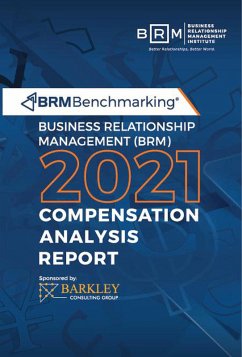
Unit 1 Introduction to Compensation and Rewards Management (eBook, ePUB)
Sofort per Download lieferbar
1,99 €
inkl. MwSt.

PAYBACK Punkte
0 °P sammeln!
Compensation and rewards management is a critical aspect of human resource management that significantly influences an organization's ability to attract, retain, and motivate its workforce. In today's competitive business environment, organizations must carefully design and manage their compensation and reward systems to ensure they align with overall business objectives and contribute to the long-term success of the company. Compensation, in its broadest sense, refers to the total financial and non-financial remuneration provided to employees in exchange for their work. This includes base sal...
Compensation and rewards management is a critical aspect of human resource management that significantly influences an organization's ability to attract, retain, and motivate its workforce. In today's competitive business environment, organizations must carefully design and manage their compensation and reward systems to ensure they align with overall business objectives and contribute to the long-term success of the company. Compensation, in its broadest sense, refers to the total financial and non-financial remuneration provided to employees in exchange for their work. This includes base salary, wages, bonuses, incentives, and various benefits such as health insurance, retirement plans, and paid leave. It is a key factor in employee satisfaction, as fair and competitive compensation is often viewed as a direct reflection of an employee's value to the organization. Moreover, compensation plays a vital role in maintaining legal compliance, as organizations are required to adhere to various labor laws and regulations regarding minimum wage, overtime pay, and equal pay for equal work.
Rewards, on the other hand, encompass a broader range of incentives that are not limited to financial compensation. They include both monetary rewards, such as bonuses and profit-sharing, and non-monetary rewards, such as recognition, career development opportunities, and a positive work environment. Rewards are essential for driving employee engagement, enhancing performance, and fostering a culture of excellence within the organization. When employees feel that their contributions are recognized and valued, they are more likely to be motivated and committed to their work. This, in turn, leads to higher productivity, better customer service, and ultimately, improved organizational performance. Effective reward management also contributes to employee retention, as employees who feel appreciated and rewarded for their efforts are more likely to remain loyal to the organization.
The importance of compensation and rewards management cannot be overstated, as it directly impacts several key areas of organizational success. Firstly, it plays a crucial role in attracting and retaining talent. In a highly competitive job market, offering a competitive compensation package can make the difference between securing top talent and losing them to competitors. Furthermore, a well-designed compensation and rewards system can serve as a powerful tool for motivating employees and enhancing job satisfaction. When employees feel fairly compensated and appropriately rewarded, they are more likely to be engaged, productive, and committed to their roles. This, in turn, reduces turnover rates and associated costs, contributing to the overall stability and growth of the organization.
Moreover, compensation and rewards management is essential for aligning employee behavior with organizational goals. By linking rewards to performance metrics and business objectives, organizations can ensure that employees are focused on activities that drive the company's success. This alignment not only enhances individual performance but also promotes a culture of accountability and continuous improvement. Additionally, effective compensation and rewards management helps organizations maintain compliance with labor laws and regulations, minimizing the risk of legal disputes and protecting the organization's reputation.
In conclusion, compensation and rewards management is a multifaceted and strategic function that plays a pivotal role in the success of any organization. By carefully designing and managing compensation and reward systems, organizations can attract and retain top talent, motivate employees, and align their efforts with the company's goals. This not only enhances individual and organizational performance but also contributes to long-term business success.
Rewards, on the other hand, encompass a broader range of incentives that are not limited to financial compensation. They include both monetary rewards, such as bonuses and profit-sharing, and non-monetary rewards, such as recognition, career development opportunities, and a positive work environment. Rewards are essential for driving employee engagement, enhancing performance, and fostering a culture of excellence within the organization. When employees feel that their contributions are recognized and valued, they are more likely to be motivated and committed to their work. This, in turn, leads to higher productivity, better customer service, and ultimately, improved organizational performance. Effective reward management also contributes to employee retention, as employees who feel appreciated and rewarded for their efforts are more likely to remain loyal to the organization.
The importance of compensation and rewards management cannot be overstated, as it directly impacts several key areas of organizational success. Firstly, it plays a crucial role in attracting and retaining talent. In a highly competitive job market, offering a competitive compensation package can make the difference between securing top talent and losing them to competitors. Furthermore, a well-designed compensation and rewards system can serve as a powerful tool for motivating employees and enhancing job satisfaction. When employees feel fairly compensated and appropriately rewarded, they are more likely to be engaged, productive, and committed to their roles. This, in turn, reduces turnover rates and associated costs, contributing to the overall stability and growth of the organization.
Moreover, compensation and rewards management is essential for aligning employee behavior with organizational goals. By linking rewards to performance metrics and business objectives, organizations can ensure that employees are focused on activities that drive the company's success. This alignment not only enhances individual performance but also promotes a culture of accountability and continuous improvement. Additionally, effective compensation and rewards management helps organizations maintain compliance with labor laws and regulations, minimizing the risk of legal disputes and protecting the organization's reputation.
In conclusion, compensation and rewards management is a multifaceted and strategic function that plays a pivotal role in the success of any organization. By carefully designing and managing compensation and reward systems, organizations can attract and retain top talent, motivate employees, and align their efforts with the company's goals. This not only enhances individual and organizational performance but also contributes to long-term business success.
Dieser Download kann aus rechtlichen Gründen nur mit Rechnungsadresse in A, B, CY, CZ, D, DK, EW, E, FIN, F, GR, H, IRL, I, LT, L, LR, M, NL, PL, P, R, S, SLO, SK ausgeliefert werden.













